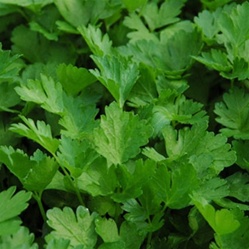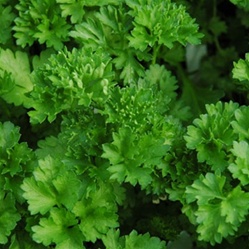Happy Parsley Day! On February 22nd, we take time to honor a much loved culinary and medicinal herb that packs a punch of flavor! An herb, a spice AND a vegetable all in one plant, this dynamic herb is a key component in many cuisines like Middle Eastern and Spanish, but is most distinctly known in Italian dishes. Parsley symbolizes love, protection and purification and throughout history has been a sign of honor and class. Ancient Greeks used Parsley to honor champions of sporting events, and it was also used in wreaths and sprinkled on the dead. The word “Parsley” is derived from the Greek word meaning “rocks or stones”, which reflects the terrain Parsley is native to. They believed that Parsley grew in the spot where the mythological hero Archemorus was slain.
The two main varieties, Italian Flat Leaf and Curly, are adored for different reasons. While some believe the Flat Leaf is easier to grow, it is the quintessential Parsley for cooking, as it has a more flavorful taste. The soft, crinkled look of the Curly Parsley makes it a great garnish and it is used to enhance many gourmet dishes with its beauty. Also a necessary component to the favorable herbal combination, Bouquet Garni, Parsley tastes terrific with hearty dishes like potatoes, stews, lamb, lasagna or rice.
Medicinally, Parsley has a long history of being associated with women’s health. An emmenagouge, it was often used to start the menstrual cycle, but should not be consumed in great quantity by pregnant women. Parsley also contains elements that help the body absorb Manganese much more efficiently, an important mineral for strengthening bones. When paired with dishes that contain high zinc or copper-rich foods, it helps retain these bone-improving vitamins and minerals much more thoroughly. When applied directly to insect bites, it is also said to soothe the itching or stinging sensation!
A great companion plant, Parsley attracts insects, diverting their attention from other garden growers. Plant Parsley near your tomatoes to draw the attention of pesky tomato hornworms, moths and flies away from your veggies. Parsley thrives in full sun, with moist, well-drained soil, but because of its tough seed coat, it can often be hard to germinate from seed. If germination actually does occur, it should only take four to six weeks to see sprouts peeking through the soil. Superstition says that the reason that Parsley takes so long to germinate is because it has to travel to Hell and back seven times before sprouting. Though we aren’t sure where this delightful herb got such a bad rap, we assure you, it’s been growing safe and sound in our greenhouse!


